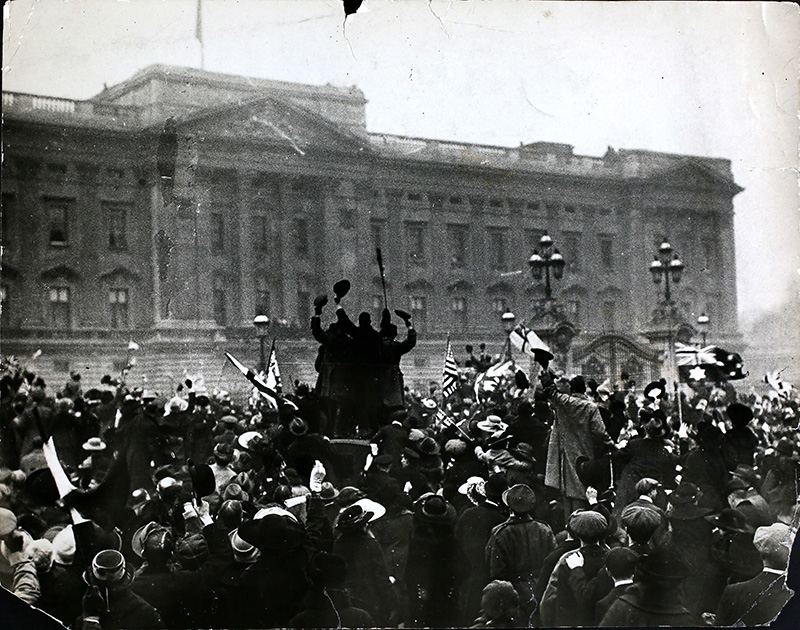The following message, delivered to all commanders on 11th November 1918, halted the British war: “Hostilities will cease at 1100 on Nov 11. All troops will stand fast and the line reached at that hour will be reported by wire to GHQ. Defensive measures will be maintained. There will be no intercourse of any description with the enemy until receipt of instructions from GHQ.” You would think that the war-weary troops, having suffered pain, loss, fatigue and cold over and over for the past 5 years, would simply sag with relief and sit tight until ordered to return to bases. However, history records all sorts of different responses to this longed-for decree.
‘The Western Front Companion’ by Mark Adkin records a frantic order for a last cavalry charge made by the commander of the 88th Infantry Brigade, Brigadier General B. C. Freyburg, VC, who had won his award “for most conspicuous bravery and brilliant leading as a Battalion Commander” on 13th November 1916 at Beaucourt sur Ancre. He ordered the 7th Dragoon Guards to dash forward to capture the bridge over the River Dendre at Lessines, 18 miles north of Mons, to prevent it from being demolished by the enemy. In hindsight, one has to wonder what significance he felt the destruction or preservation of a single bridge would have in the face of international peace, but then it has to be remembered that peace had not been anything but a distant memory to these men for half a decade, and war thoughts had to be brought to the fore. So, the dragoons galloped hell-for-leather, covering 10 miles in 90 minutes, and bust into Lessines. They first came under fire from machine guns, then shots were fired from a house in Main Street and one actually hit Freyburg’s saddle. They rushed bridge minutes before the cease-fire, capturing three German officers and 103 soldiers (indeed, some of the men claimed they were captured after the fateful chimes).
Another, somewhat strange, display of last-minute action came from the final US casualty of the war according to ‘The First World War: A Miscellany’ by Norman Ferguson, Private Henry Gunther. Killed at 10.59am, in his last act he stormed a German machine-gun position single-handed. Despite being frantically waved back by German soldiers, who really had no intention of killing him, he kept coming and forced their hands.
The last German casualty was conversely killed by Americans, and had even less intention of killing the nervous soldiers that he approached after 11am to greet as friends. Unfortunately for both parties, they had not yet received the order to disarm and were unaware that the war had ended. As Lieutenant Thoma approached their position they panicked and shot him.
In a far better position to receive the news was Major Hugh Shadbolt, Royal Artillery, who according to Mark Severn’s story ‘The Advance, 1918’ was watching his troops drag guns into a clearing in the Forest of Mormal. The enemy was at the time out of range, and there were no immediate gains to be made in the area. So, Major Shadbolt was at liberty to sag with relief, and simply said, “Mr Straker, you can fall the men out for breakfast. The war is over.”
There was of course great jubilation back in Britain that the war was over, and cheering crowds flooded Trafalgar Square, The Mall and the roads to Buckingham Palace, singing songs until the King and Queen answered their summons and emerged onto the balcony to be with the people. However, on the Front the rejoicing was far quieter. Every man there had seen things he would never forget, watched friends die, or lost family members. Every man had experienced far and misery such as he hoped never to see again. Amongst the soldiers, there were no winners.
Indeed, according to ‘The Battle for Europe 1918’ by H Essame, the French General Mangin, on hearing that the Armistice had been signed in France, and that despite the surrender of their war equipment and naval fleet the German troops were to be allowed to march home in formation carrying their personal rifles, burst into tears of frustration. “No! No! No!” he shouted. “We must go right into the heart of Germany. The Armistice should be signed there. The Germans will not admit they are beaten. You do not finish wars like this… and who will see that the conditions are enforced? The Allies? A coalition has never survived the danger which has created it. It is a fatal error, and France will pay for it.” History was to prove how right he was in this dire prediction, as 20 years later the Nazis would later claim that Germany had never lost the war, only made a peace treaty, and that the only reason the country hadn’t won was that it had been “stabbed in the back by Jews”. Even as the bells for peace rang out, the dark clouds of World War Two were gathering.
For now, though, the people had to push aside their grief and despair and, British, French and German alike, work to rebuild their nations. 1.1 million British and Commonwealth soldiers had been killed, and must be mourned and where possible buried. Soon the surviving soldiers would return home to their loved ones, and try to pick up their lives where they had left off. Recovering from the war was not going to be a simple process, and many would carry physical or mental wounds for the rest of their days; but life goes on. A speech by David Lloyd George at Wolverhampton on 23rd November 1918, quoted in ‘The First World War Miscellany’, summed up nicely what remained to be done: “The work is not over yet – the work of the nation, the work of the people, the work of those who have sacrificed. Let us work together first. What is our task? To make Britain a fit country for heroes to live in.”


